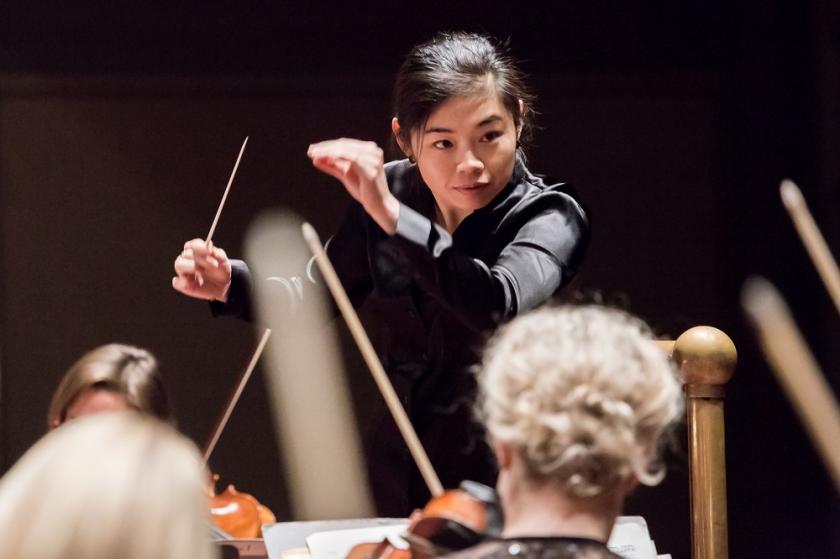Two women featured prominently in this programme; the one a composer and the other a conductor.
To the composer first. Long before she hit New York big time, Anna Clyne was at Edinburgh University, so there’s a strong link with Scotland that the Scottish orchestras aren’t afraid to exploit. Her 2015 piece This Midnight Hour might have been inspired by two delicate poems, but its mood and tone have the sweep of a film score, and a dashed exciting one at that.
The opening is a turbulent eruption from the cellos and basses, leading into jagged shards of music that seem to flicker in the light like a reaction against something stirring in the deep. It certainly brought out the best in the Royal Scottish National Orchestra, which built the sound from the basses upwards, with thrilling winds shrieking in horror against hyperactive violins before a melancholy valse triste swirled in from nowhere and led into a percussive finale that had the shock of a TNT blast.
 Those strings which were such a weighty characteristic of Clyne’s work (the composer pictured right by Jennifer Taylor) were also a terrific feature of Tchaikovsky’s Fifth Symphony. They brought narrative drama to the opening, surging passion to the slow movement and triumphal grandeur to the finale. However, the real key to that symphony’s success was the lady on the podium. Elim Chan has been a massive hit as the RSNO’s Principal Guest Conductor for the last five years, and this concert was her goodbye to the role.
Those strings which were such a weighty characteristic of Clyne’s work (the composer pictured right by Jennifer Taylor) were also a terrific feature of Tchaikovsky’s Fifth Symphony. They brought narrative drama to the opening, surging passion to the slow movement and triumphal grandeur to the finale. However, the real key to that symphony’s success was the lady on the podium. Elim Chan has been a massive hit as the RSNO’s Principal Guest Conductor for the last five years, and this concert was her goodbye to the role.
What finer way to go out than with Tchaikovsky’s great journey from dread to elation? Chan’s conductorial style is to demonstrate contained energy. She’s a terrific source of propulsive power on the podium but her stage persona is kept within a limited space and she never loses control. So her interpretations carry tremendous weight but with respect to the music’s boundaries. She shaped Tchaikovsky’s great drama with tremendous focus, relaxing a little in the waltz after the high drama of the slow movement, but letting everything rip in a finale whose main allegro theme had bullet-like clarity to it. Aside from a slightly too forthright horn solo in the slow movement, the orchestra played it brilliantly, too, no doubt partly out of affection for Chan’s goodbye.
I wish they’d found her a more gripping companion piece in the first half, though. The strings sounded suitably soft in Mozart’s Piano Concerto No. 12, and Steven Osborne played the solo part with subtlety and delicacy, but I struggle to get excited about these middle period Mozart concertos. They’re the work of a young man on the verge of greatness, but they’re also a little anonymous in comparison with the brilliance that was just around the corner, and if everyone isn’t very careful then they can become rather forgettable.
That’s never a word that will be applied to Chan. Her time with the RSNO has been a triumph and she’ll be missed enormously: both the audience and the orchestra were cheering her to the rafters at the end, and rightly so.















Add comment